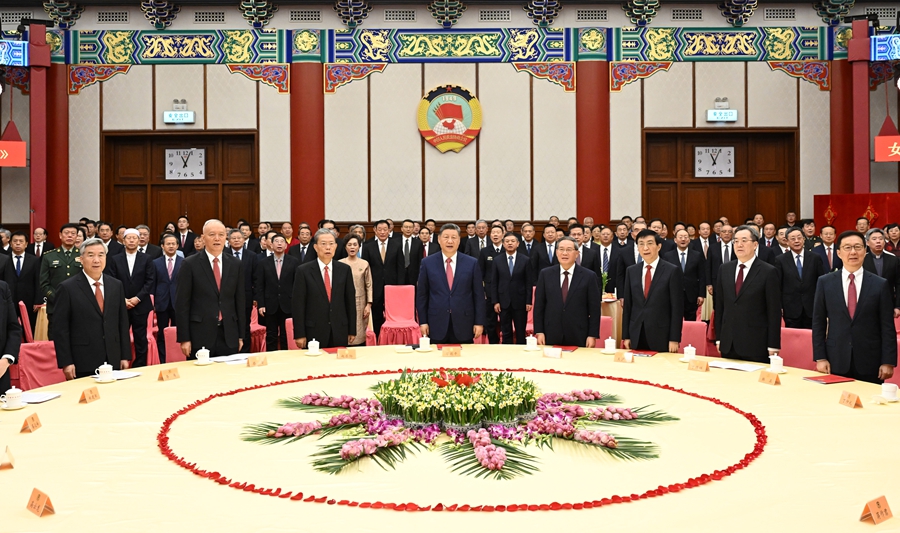COMPENSATION ISSUE RETURNS TO POLITICAL AGENDA.
COMPENSATION ISSUE RETURNS TO POLITICAL AGENDA.
On June 13 the Lithuanian parliament adopted a law on the compensation of material damages the Soviet Union inflicted during their occupation of the country. Initiated by Parliament Chairman Vytautas Landsbergis, the law passed with 68 votes in favor, 14 abstentions and none opposed in the 131-seat chamber. The move aims to initiate negotiations with Moscow on restitution payments, specifically for the decimation and deportation of Lithuanians and for environmental ravages to the country.
The adopted law requires the government to (1) appoint before September 1 a delegation for negotiations with Russia, (2) prepare before October 1 realistic financial estimates of damages inflicted during the nearly 50-year occupation and (3) submit before November 1 those estimates to the Russian government and call on it to begin negotiations. The law, furthermore, creates a compensation fund, to be financed from both Russian voluntary contributions and special surcharges on transit between Russia proper and the Kaliningrad region. Such surcharges would primarily affect military cargoes destined for Russian forces. The law will not go into effect until it is signed by Lithuanian President Valdas Adamkus.
Compensation claims lay dormant in recent years, but arose originally as part of the agenda of Baltic liberation movements in the early 1990s. A Lithuanian national referendum in 1992 called on Russia to make restitution payments for occupation-era damages. Baltic compensation claims were inspired by–and urged Moscow to follow the example of–the Federal Republic of Germany, which has been making restitution payments to countries occupied by Nazi Germany during World War II. Berlin’s recent consent to create a new, multibillion-Deutschmark fund to compensate former forced laborers and their families–including those from the Baltic states–apparently helped inspire Lithuania to ask for an overdue acknowledgement of Moscow’s responsibility.
The heads of government of Estonia and Latvia expressed political support for the Lithuanian initiative during the meeting of Baltic Council of Ministers in Parnu, Estonia on June 16. Estonian Prime Minister Mart Laar, speaking on this issue in his capacity as chairman of the Pro Patria Union, welcomed the fact that the idea of restitution has been placed on the current political agenda. Latvia’s Prime Minister Andris Berzins remarked that this is the only way to tell the world what actually happened in the Baltic states during a half-century of military occupation, mass repression and population displacement. The two agreed with their Lithuanian counterpart, Andrius Kubilius, that the Balts must not let the world ignore, or Russia dismiss, these nations’ irreparable losses during that period. Laar and Berzins recommended that the Baltic states coordinate their moves on the issue of compensation claims and that they place this issue on the agenda of the Baltic Assembly, the three countries’ joint parliamentary body (BNS, January 13-17).
In contrast to Germany’s admission of responsibility, the Russian government is not only denying its own, but also increasingly tending to legitimize the Soviet occupation retroactively. Moscow’s official position has held for some time that the three Baltic states had “joined the Soviet Union.” On June 9, a statement of Russia’s Foreign Affairs Ministry went further: it maintained that the Baltic states had been “admitted into the Soviet Union” on the basis of “requests by the Baltic states’ parliaments” and “in accordance with international law. Assertions about an ‘occupation’ and ‘annexation’… ignore the political, historical and legal reality and are therefore baseless” (Itar-Tass, June 9; see the Monitor, June 13). On June 13, Russia’s Federation Council Chairman Yegor Stroev declared that Balts ought to be grateful for “the Soviet Union’s colossal material contribution to their economic development. It is a shame and a sin to raise such issues [compensation] after all that has been done for the Pribaltika [Soviet-era designation of the three Baltic states] (Itar-Tass, June 14).
Such statements undoubtedly form part of the “war of words”–as U.S. Deputy Secretary of State Strobe Talbott recently termed it–intended to chastise the Baltic states for their Western orientation. By reverting to classical Soviet positions, the Kremlin can only spur demands that Russia own up to its responsibility, as the legal successor of the Soviet Union, for the economic and demographic damages inflicted on the Balts. The Russian government for its part maintains that it bears no responsibility for actions of the Soviet government in the Baltic states–an argument suggesting that the legal succession does not apply in this case. In response, Russian democrat Sergey Kovalyov–speaking last week in Vilnius and Tallinn–called on the Russian government and nation to recognize the fact that the Soviet occupation had, in fact, been a Russian occupation, which will severely burden Russian-Baltic relations until its real nature is recognized on the Russian side. Kovalyov called for moral, not financial restitution by Russia to the Balts (see the Monitor, June 16).
Hardly anyone in the Baltic states or in the outside world can expect Russia to enter into negotiations about compensation, let alone make restitution payments. Lithuania’s initiative is largely symbolic and political, as would be any follow-up move by Latvia, Estonia or the Baltic Assembly. It seems designed primarily to refute Moscow’s recent attempts to legitimize historically the subjugation of the Baltic states and to claim any legal right to their current policies on the basis of former, discredited arrangements.
The Monitor is a publication of the Jamestown Foundation. It is researched and written under the direction of senior analysts Jonas Bernstein, Vladimir Socor, Stephen Foye, and analysts Ilya Malyakin, Oleg Varfolomeyev and Ilias Bogatyrev. If you have any questions regarding the content of the Monitor, please contact the foundation. If you would like information on subscribing to the Monitor, or have any comments, suggestions or questions, please contact us by e-mail at pubs@jamestown.org, by fax at 301-562-8021, or by postal mail at The Jamestown Foundation, 4516 43rd Street NW, Washington DC 20016. Unauthorized reproduction or redistribution of the Monitor is strictly prohibited by law. Copyright (c) 1983-2002 The Jamestown Foundation Site Maintenance by Johnny Flash Productions


